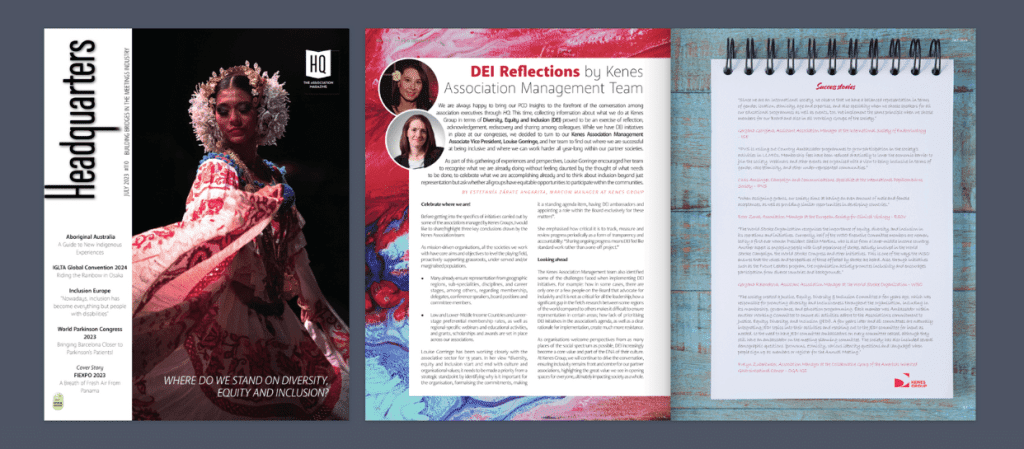
While we have DE&I initiatives in place at our congresses, we decided to turn to our Kenes Association Management Associate Vice President Louise Gorringe and her team to find out where we are successful at being inclusive and where we can work harder all year long within our partner societies.
As part of this gathering of experiences and perspectives, KAM AVP Louise Gorringe encouraged her team to recognise what we are already doing without feeling daunted by the thought of what needs to be done, to celebrate what we are accomplishing already and to think about inclusion beyond just representation but ask whether all groups have equitable opportunities to participate within the communities.
Celebrate where we are!
Before getting into the specifics of initiatives carried out by some of the associations managed by Kenes Group, I would like to share/highlight three key conclusions drawn by the Kenes Association team:
• As mission-driven organisations, all the societies we work with have core aims and objectives to level the playing field, proactively supporting grassroots, under-served and/or marginalised populations.
• Many already ensure representation from geographic regions, sub-specialities, disciplines, and career stages, among others, when it comes to membership, delegates, conference speakers, board positions and committee members.
• Low and Lower-Middle Income Countries (LLMIC) and career-stage preferential membership rates, as well as regional-specific webinars and educational activities, and grants, scholarships and awards are set in place across our associations.
Louise Gorringe has been working closely with the associative sector for 13 years. In her view “diversity, equity and inclusion start and end with culture and organisational values; it needs to be made a priority from a strategic standpoint by identifying why is it important for the organisation, formalising the commitments, making it a standing agenda item, having DE&I ambassadors and appointing a role within the Board exclusively for these matters”.
She emphasised how critical it is to track, measure and review progress periodically as a form of transparency and accountability: “Sharing ongoing progress means DE&I feels like standard work rather than a one-off project.”
Success stories
“Since we are an international society, we observe that we have a balanced representation in terms of gender, location, ethnicity, age and expertise, and also speciality when we choose speakers for all our educational programs as well as events, too. We implement the same principle when we choose members for our Board and also in all Working Groups of the society.”
Gergana Georgieva, Assistant Association Manager at the International Society of Endocrinology – ISE
“IPVS is rolling out Country Ambassador programmes to grow participation in the society’s activities in LLMICs. Membership fees have been reduced drastically to lower the economic barrier to join the society. Webinars and other events are organised with a view to being inclusive in terms of gender, race/ethnicity, and other under-represented communities.”
Chris Amsinger, Campaign and Communications Specialist at the International Papillomavirus Society – IPVS
“When assigning grants, our society aims at having an even amount of male and female acceptances, as well as providing similar opportunities in developing countries.”
Ester Zoroa, Association Manager at the European Society for Clinical Virology – ESCV“The World Stroke Organization recognizes the importance of equity, diversity, and inclusion in its operations and initiatives. Currently, half of the WSO Executive Committee members are women, led by a first-ever woman President Sheila Martins, who is also from a lower-middle income country. Another aspect is engaging people with lived experience of stroke, actively involved in the World Stroke Campaign, the World Stroke Congress and other initiatives. This is one of the ways the WSO ensures that the voices and perspectives of those affected by stroke are heard. Also, through initiatives such as the Future Leaders program, the organisation actively promotes inclusivity and encourages participation from diverse countries and backgrounds.”
Gergana Ralenekova, Assistant Association Manager at the World Stroke Organization – WSO
“The society created a Justice, Equity, Diversity & Inclusion Committee a few years ago, which was responsible for promoting diversity and inclusiveness throughout the organisation, including in its membership, governance, and education programming. Each member was Ambassador within another Working Committee to ensure all activities adhere to the Association’s commitment to Justice, Equity, Diversity, and Inclusion. A few years later and all committees are naturally integrating JEDI topics into their activities and reaching out to the JEDI committee for input as needed, so the need to have JEDI committee ambassadors on every committee ceased, although they still have an ambassador on the meeting planning committee. The society has also included several demographic questions (pronouns, ethnicity, various identity questions and language) when people sign up as members or register for the Annual Meeting.”
Evelyn Zuberbuhler, Association Manager at the Collaborative Group of the Americas Inherited Gastrointestinal Cancer – CGA-IGC
Looking ahead
The Kenes Association Management team also identified some of the challenges faced when implementing DE&I initiatives. For example: how in some cases, there are only one or a few people on the Board that advocate for inclusivity and it is not as critical for all the leadership; how a significant gap in the field’s research between some regions of the world compared to others makes it difficult to ensure representation in certain areas; how lack of prioritising DE&I initiatives in the association’s agenda, as well as a clear rationale for implementation, create much more resistance.
As organisations welcome perspectives from as many places of the social spectrum as possible, diversity, equity and inclusion increasingly become a core value and part of the DNA of their culture.
At Kenes Group, we will continue to drive the conversation, ensuring inclusivity remains front and centre for our partner associations, highlighting the great value we see in opening spaces for everyone, ultimately impacting society as a whole.
By Estefanía Zárate Angarita
MarCom Manager
This article was originally published in HQ Magazine #110 / Where do we stand on Diversity, Equity and Inclusion?, July 2023: https://bit.ly/44jPxV0